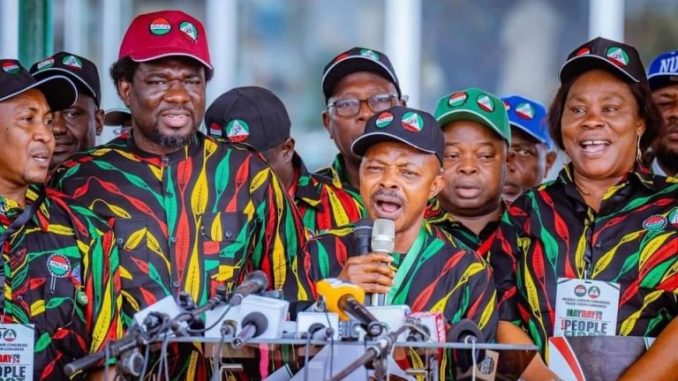The Nigerian labour movement is pushing for the announcement, passage, and implementation of a new minimum wage law before the end of July 2024.
This was highlighted by Comrade Festus Osifo, President of the Trade Union Congress of Nigeria (TUC), during a visit from Onuh Edoka, Special Adviser on Labour Matters to the Kogi State Governor, in Abuja.
Osifo emphasized the urgency for the national tripartite negotiation committee—comprising government, labour, and organized labour—to reach an agreement quickly.
He stressed the importance of prompt attention from President Bola Tinubu and the National Assembly to pass the bill into law. Osifo stated:
“We aim to have a new minimum wage law passed and signed by the President before the end of July to improve the workers’ plight amid the current economic challenges. This will help workers manage the skyrocketing inflation in the country.
“Labour has proposed a 250,000 Naira minimum wage, while the government and organized private sector have suggested 62,000 Naira.
All parties need to come together to reach a consensus, so the President can send the bill to the National Assembly and ensure the new national minimum wage is enacted.”
Osifo praised the Kogi State government for paying the current 30,000 Naira minimum wage and urged other state governments to prepare for the new wage implementation.
He mentioned that some states, like Nasarawa, are already setting aside funds for this purpose. Osifo assured that labour unions would push for state-by-state implementation once the new wage act is passed.
Onuh Edoka commended Governor Ahmed Ododo’s administration for improving worker welfare in Kogi State. He noted that the current administration has corrected previous shortcomings and implemented labour-friendly measures.
Edoka appealed for support from the TUC to enhance Kogi State’s image, tarnished by the previous administration, and confirmed that the state is now paying the 30,000 Naira minimum wage as required.
Edoka expressed optimism about the future and praised the government’s efforts to support workers, calling for continued collaboration to prioritize worker welfare.
This development underscores the commitment of labour unions and the government to address worker welfare and economic challenges in Nigeria through the timely implementation of a new minimum wage.




